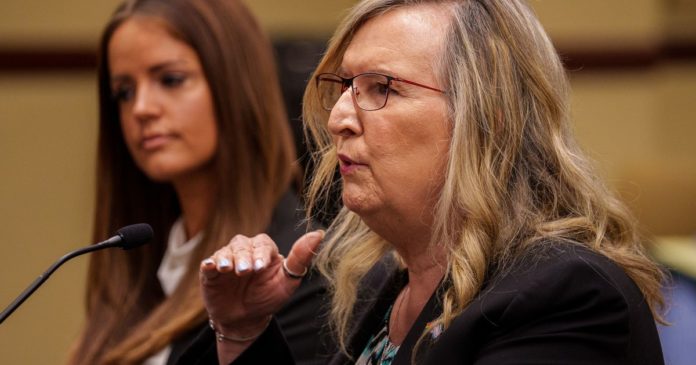
As they consider legislation affecting transgender youth, Utah lawmakers on Wednesday heard on one hand from a University of Utah doctor who runs a clinic serving hundreds of teens who are exploring or undergoing a transition.
On the other side of the issue was a selection of non-physicians, who offered up research from a group that links being gay with pedophilia and compares adolescent transgender health care to “child abuse.”
But in the end, some Utah legislators said they remained torn about who they should listen to as they think about limiting youth access to medication that suppresses puberty and other gender-affirming health care.
“Truth is, I don’t know who to believe,” Sen. Jake Anderegg, R-Lehi, said during the committee hearing. “And the truth is, I don’t know that I believe either of you. And the truth is, I think we don’t have enough information.”
No decisions came out of the hearing — although lawmakers have said they do plan to introduce future legislation on adolescent health care and how transgender students participate in school sports. Instead, Wednesday’s meeting was supposed to serve as an open forum for discussion and questioning experts about what legislators acknowledged are sensitive and potentially divisive topics.
Their examination of these issues follows this year’s unsuccessful bid in the Legislature to bar transgender girls from female school sports and to prevent physicians from inhibiting puberty or performing a “sex characteristic-altering procedure” on a patient 16 or younger. These types of bills have passed in state Legislatures across the nation in the past year, pushed by socially conservative groups that have found these measures energize their supporters.
Those leading the charge in Utah say their objective is to preserve the fairness of girls’ school sports and protect children from making premature medical decisions.
“Our children are so important, and we love them, and we don’t want to do irreversible damage,” Rep. Rex Shipp said. “Sometimes we just have to say, you know, let’s wait on this. Maybe you’re going to be fine, and then they can transition later.”
But the outcome of this debate in the state could have life-or-death consequences, said Sue Robbins, of Equality Utah’s Transgender Advisory Council. This group is at far higher risk of suicide, Robbins noted, with one survey of transgender individuals finding that 41% had attempted suicide at some point in their lives.
Further stigmatizing these youth in doctor’s offices and on playing fields would only endanger them more, Robbins argued.
“We feel like our existence is under attack,” she told state lawmakers. “We have a significant amount of our precious youth that will be impacted by what we do here.”
What happens in Utah when a transgender adolescent or teen seeks gender-affirming care?
Dr. Nicole Mihalopoulos, medical director of the University of Utah’s adolescent and young adult medicine clinic, told legislators Wednesday that about 15 to 20 new patients each month come to her office seeking care for gender dysphoria — or feelings of distress that arise when a person’s internal gender identity doesn’t match their sex assigned at birth.
Most families arrive with “tremendous caution,” she explained, with parents eager to be caring and supportive but also wanting time to understand what their child is experiencing.
In supporting these young patients, she said, physicians follow best practices crafted by an array of major medical organizations, including the American Academy of Pediatrics, the World Professional Association for Transgender Health and the Endocrine Society.
One early step is to help young people transition socially by using pronouns and other gender signifiers that align with their identity. Physicians might then prescribe medications that “temporarily and reversibly” pause puberty and later might move the patient to testosterone or estrogen treatments, Mihalopoulos said.
While researchers haven’t concluded these medications cause infertility, patients and physicians discuss precautionary fertility preservation options before the start of hormone treatments.
No one under the age of 18 in Utah is getting gender-affirming genital surgery, she said, but a small number of teenage patients undergo “chest masculinization” procedures — more commonly called “top surgery.”
“At the University of Utah, in our transgender health program, that is a decision that is vetted by many,” she said. “A patient has to undergo a pretty significant process to reach a place where they are going to have chest masculinization surgery.”
Before qualifying for one of these surgeries, a patient participates in regular therapy sessions and takes testosterone for at least a year, she said. Two parents would have to consent to the procedure, which would even then still be at the discretion of the surgeon.
Mihalopoulos said her clinic’s youngest patient was 8 years old. While they did not prescribe any hormones to the child at that age, the doctor said the onset of puberty generally determines when physicians might begin prescribing puberty blockers.
Who wants to restrict this health care?
During the last legislative session, Shipp, R-Cedar City, sponsored legislation that would make it unprofessional conduct for a physician to “perform a medically unnecessary puberty inhibition procedure or a sex characteristic-altering procedure” on a minor.
That measure failed, but Shipp is continuing his push, arguing that children and teens experiencing gender dysphoria should wait until adulthood for hormone treatments and gender-affirming surgeries.
“I believe that this dysphoria is real and causes an extreme stress,” he said. “But my concern is we’re treating symptoms and not getting to the root of the problem, which is a mental health issue. It has nothing to do with the physical body.”
(Trent Nelson | The Salt Lake Tribune) Rep. Rex Shipp, R-Cedar City, speaks at a meeting of the Health and Human Services Interim Committee at the State Capitol in Salt Lake City on Wednesday, June 16, 2021. Transgender treatment for minors and participation by transgender youth in school sports were the topics of discussion. At left is David Pruden.
The legislator supplied the health and human services committee with a report that listed examples of people who regretted their gender transition and reversed it. The report drew on contributions from nearly 20 individuals, several from the American College of Pediatricians — an organization deemed an anti-LGBTQ hate group by the Southern Poverty Law Center.
The group has characterized gender-affirming care as “conditioning children into believing a lifetime of chemical and surgical impersonation of the opposite sex is normal and healthful” and condemns it as “child abuse.” It has also argued that LGBTQ advocates have “pedophilia intrinsically woven into their agenda.”
Shipp said during Wednesday’s hearing that he was unaware that the group was designated as a hate group.
He brought with him a couple others who want to limit transgender health care, including one woman who said she identified as a boy when she was young but after receiving mental health care concluded her gender dysphoria was the result of a sexual assault from her early childhood.
“Far too many children who suffer from gender dysphoria these days are not so lucky,” said Erin Brewer, who introduced herself as having a doctorate in instructional technology and learning science. “They are told that they’re inherently flawed and that the only solution is to damage their healthy bodies by medically transitioning.”
However, Mihalopoulos said out of about 700 patients, her clinic has only had one who has asked to stop taking hormones.
While there is a scarcity of data about the long-term health effects of gender-affirming treatment, she said studies have linked this care to mental health benefits. And she — like the American Medical Association and other prominent health care groups — urged lawmakers not to block youth from accessing care that in some cases “is necessary to keep many of these kids alive and to have a good mental health outcome.”
How do transgender students currently participate in school sports?
The later portion of the hearing focused on transgender girls competing in female school sports.
A failed bill sponsored this year by Rep. Kera Birkeland would’ve excluded these transgender students from female athletics, and she has already said she’s bringing back a proposal on this issue in the 2022 legislative session. On Wednesday, she told her colleagues that both cisgender and transgender female athletes need the state to provide clear guidelines so everyone can feel confident that no one has an unfair advantage.
“These games are about competition,” the Morgan Republican said. “And they are about winning.”
(Trent Nelson | The Salt Lake Tribune) Dave Spatafore holds up the UHSAA’s policy on transgender athletes, with Rep. Kera Birkeland, R-Morgan, at a meeting of the Health and Human Services Interim Committee at the State Capitol in Salt Lake City on Wednesday, June 16, 2021. Transgender treatment for minors and participation by transgender youth in school sports were the topics of discussion.
The NCAA and the Utah High School Activities Association already have policies in place for transgender athletes, according to Wednesday’s testimony.
David Spatafore of the Utah High School Activities Association said the organization allows transgender girls to participate in sports matching their gender identity, so long as the student has completed at least a year of hormone treatment. The association hasn’t gotten any complaints about the policy in the year since releasing it, he said, and he asked for state protection against litigation if the Legislature decides to change course.
“We’ll pay our defense costs under our policy,” he said. “If you pass legislation, we would ask that our costs be paid for by the state.”
Spatafore also told lawmakers his organization has had “no experience of working with transgender youth” in any of its activities — an assertion that could support the argument of LGBTQ advocates who say bills such as Birkeland’s strike at a non-existent problem.
“The strong concerns about this being a large issue are misplaced in my mind,” said Robbins, who added that “targeting the only transgender girls who are successful across all states would indicate that any success by our community would be met with attempts to take that small level of pride and inclusion away from us.”
However, Birkeland said the biggest concern over transgender sports participation is unfolding at the junior high level, which does not have a set policy for these athletes. She said she knows of several transgender athletes in Utah schools but would not provide details about them.








